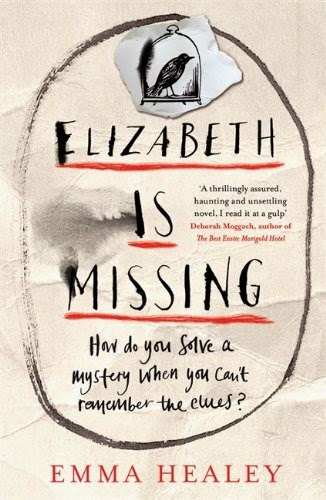One of the tragedies of dementia is the way in which the ordinary is rendered unfamiliar. Names of people and everyday objects are forgotten; life becomes a mystery to be solved. This aspect of the condition is beautifully played out in Elizabeth Is Missing in which eighty-one-year-old Maud attempts to resolve the dual mysteries of the sudden absence of her good friend, Elizabeth, as well as the disappearance of her elder sister in her 1940s childhood. Maud, like a true detective, tells us how she tries
to be systematic, […] to write everything down. Elizabeth is missing and I must do something to find out what’s happened. But I’m so muddled. I can’t be sure about when I last saw her or what I’ve discovered. I’ve phoned and there’s no answer. I haven’t seen her. I think. She hasn’t been here and I haven’t been there. What next? I suppose I should go to the house. Search for clues. And whatever I find I will write it down. I must put pens into my handbag now. The thing is to be systematic. I’ve written that down too. (p22)
The Night Guest also starts with a mystery: Ruth, a seventy-five-year-old widow living alone in a house by the sea, is woken at four in the morning by the noise of a tiger in the next room:
Something large was rubbing against Ruth’s couch and television and, she suspected, the wheat-coloured recliner disguised as a wingback chair. Other sounds followed: the panting of a large animal; a vibrancy of breath that suggested enormity and intent; definite mammalian noises, definitely feline, as if her cats had grown in size and were sniffing for food with huge noses. (p1)
Dementia is also something of a mystery for those who witness the decline in a relative, as explored by a son trying to care for his mother in Scar Tissue:
When I could think about anything at all, I thought that the simplest facts about what had happened would never be clear: when her illness commenced, when she was first aware of it, whether the manner in which she had struggled with it delayed or altered its course in any way; whether the manner in which we cared for her and fought to keep her aware of her surroundings helped to slow its passage through her brain; whether it was an illness of memory or an illness of selfhood. Simple explanations will not do. They fail to accord her the necessary respect. (p170)
Second childhood
In their confusion, decreased competence and need for extra assistance with navigating the tasks of daily life, dementia sufferers might sometimes seem like children. This can cause frustration in relatives as in these two quotes from characters in Getting Away With It:
‘Sounds monstrous, doesn’t it? But it’s maddening, an adult acting like a child. And it isn’t like normal illness, because they won’t get better …’
‘If she were whole, herself, I could argue with her … I want her to be herself again so I can be angry with her properly …’ (p368)
Memories of the distant past are often sharper than those of more recent events, so it makes sense that Maud, in Elizabeth Is Missing, should return to an unresolved issue from her childhood. In The Night Guest, Ruth’s experience of the tiger prowling her lounge is reminiscent of a child’s conjuring of fairies, monsters or an imaginary friend. Unfortunately, her childlike innocence leaves her ripe for exploitation.

As people lose parts of themselves and their memories, filling the gaps with imagined or borrowed events can serve as a way of alleviating the distress of not knowing. Part of the appeal of both Elizabeth Is Missing and The Night Guest is the humorous ways in which the main characters attempt to compensate for and/or cover up their failings. For example, Ruth, after discovering her carer in tears, comes up with the platitude:
‘… There are plenty more fish in the deep blue sea.’
Ruth found it easy to say these things from the safety of her chair. It was a little like recovering a language she’d forgotten she knew and still wasn’t entirely sure of the sense of. (p203)
Although dementia is only a minor subplot in Getting Away With It, I’ve included it here for a truly wonderful set piece when the elderly mother mistakes a scene from the film Casablanca for her own memory:
‘It was our song,’ my mother was saying. ‘Harvey and I would listen to it in Paris, before any of this started. Young lovers. And when I saw Sam, I couldn’t help it; I asked him to play it for me.’ (p450)
It isn’t difficult to see the appeal. In Scar Tissue, a more serious novel than any of the other three, the narrator speculates on this same process from a new logical perspective:
The brain … appears to have some capacity to re-wire itself, to channel functions out of scarred zones into healthy ones. Not all areas of the brain are operative: apparently empty rooms are kept in waiting, ready for emergencies. She hid her memories of me in these rooms in the hope that disease might not find them, my name in one room, the memory of my face in another, the sound of my voice in a small closet at the end of the corridor. But the disease was thorough. It tracked down her memory, room by room, snuffing out each synaptic spark. (p164)
Terror
Ruth is initially thrilled to have a visit from a tiger, but this sense of specialness soon turns to fear. Similarly, she fluctuates between appreciation and terror regarding the care she receives from Frida. Visiting a police station, Maud feels overwhelmed by her inability to focus on why she is there:
I must do the thing I came to do. For a moment I can’t think what it is. My mind is blank. My arm starts to shake and my heart beats in my stomach. I take a deep breath and put a hand into the pocket of my cardigan, looking for a note. (p75)
But the most chilling description comes in Scar Tissue when, after having witnessed his mother’s deterioration, the narrator begins to suffer from the condition himself:
What I know now, what I have learned from her, is that there are two forms of death, not one. In one form, everything which holds us in this world, everything we love, may remain precious until the last instant. Everything will stay as it is. Faces will mean what they have always meant to us. In this form of death, life holds all its beauty to the last second.
Then there is a form of dying in which everything familiar becomes strange, everything known becomes unknown, everything true becomes false, everything loved becomes indifferent, everything pitiful becomes pitiless, everything compassionate becomes as hard as stone. This room will soon become a prison. The doors will be locked. I will try the handles. I will not be able to escape. The faces of my wife, my children and my brother will blur, decompose and then reform into the image of jailers. My own hands, my own face, my own thoughts will seem alien to me. The words I utter will make no sense, not even to me. I will be dying, but with my eyes open. (p198-199)
I challenge anyone to come up with a better description of terror.
Finally, if that doesn’t sufficiently cover the condition, there’s my own flash fiction piece, No Milk or Sugar, a play on the tragicomic element of mistaken identity; Paula Reed Nancarrow’s moving piece of life writing about the puzzle of dementia in her own family; and Caroline Lodge’s inspiring blog post about reading and writing projects for people with dementia.
Apologies for an unusually lengthy post. I welcome your feedback.

























 RSS Feed
RSS Feed





















